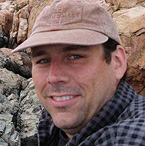His Fault: Faults, as Nick Hayman will tell you, are hazardous. They can also tell us about fundamental planetary processes such as plate tectonics
September 23, 2007

Nick Hayman joined the Institute for Geophysics as a research associate in September 2007.
Hayman’s research interests include structural geology and geodynamics. He is working in the Marine Seismology group studying the ocean crust, particularly the geological structure of fault zones.
“I look at things we see in the geological record in order to quantify certain parameters,” Hayman said. “For instance, I am studying fracture distribution in submarine exposures of oceanic crust to understand what controls its geophysical properties.”
One of his current experiments, inspired by a series of geologic studies in California, is studying how stress is supported in fault zones using both the geologic record and experimental faults.
“Faults are a cornerstone of plate tectonics and they are at the heart of our understanding of the earth and other planets,” Hayman said. “At the same time they are hazardous and pose environmental concerns, including those related to energy recovery. We want to understand their physical nature, but there are some big gaps in our knowledge.”
Hayman finds that collaborating with other researchers at the Institute provides valuable insights.
“It’s been an eye opener working with marine geologists, geophysicists, and even biologists to develop projects that 10 years ago were impossible,” Hayman said. “The techniques and ideas we are working on are relevant for a broad range of studies.”
Hayman earned his Ph.D. in geology from the University of Washington, and also holds an M.S. in geology from the University of Albany, SUNY.
For more information about the Jackson School contact J.B. Bird at jbird@jsg.utexas.edu, 512-232-9623.
